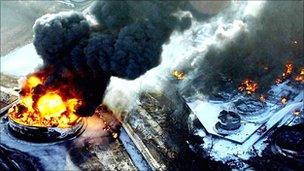Firms ordered to pay almost £10m over Buncefield blast
- Published

Forty-three people were injured in the Buncefield depot blast on 11 December 2005
Five firms have been ordered to pay almost £10m between them in combined fines and costs for their parts in the Buncefield oil depot explosion.
French energy giant Total must pay £6.2m for failing to protect workers and the public over the 2005 explosion.
Hertfordshire Oil Storage Limited (HOSL) must pay £2.4m and British Pipeline Agency Ltd must pay £780,000.
TAV Engineering Ltd and Motherwell Control Systems were told at St Albans Crown Court they must pay £1,500 each.
Total were fined £3.6m with £2.6m costs, Hertfordshire Oil Storage Limited received a £1.45m fine with £1m costs and British Pipeline Agency Ltd must pay a £300,000 fine plus £480,000 costs.
Motherwell Control Systems 2003 Ltd and TAV Engineering Ltd were both fined £1,000 with £500 costs.
Timing 'miraculous'
Judge Sir David Calvert-Smith said: "Had the explosion happened during a working day, the loss of life may have been measured in tens or even hundreds.
"The failures which led in particular to the explosion were failures which could have combined to produce these consequences at almost any hour of any day.
"The fact that they did so at 6.01 on a Sunday morning was little short of miraculous.
"So too was the fact that not one of the few people on the site or in the surrounding area on that Sunday morning lost their lives."
Total UK company secretary Lee Young apologised "to all those who have been affected by the incident", adding that the firm fully accepted "our responsibilities for the events that took place at Buncefield in 2005".
But Hemel Hempstead MP Mike Penning has condemned the level of fines and said he would ask Attorney General Dominic Grieve to assess whether they were too lenient.
"I am deeply disappointed at the leniency of the financial fines.
"None of this money will compensate my constituents who are still waiting for compensation for having their businesses, lives, homes and health destroyed by an industrial disaster which should never have happened and was obviously completely preventable.
"I will be using the powers I have as an MP to ask the Attorney General if he thinks that the sentence has been unduly lenient.
"Frankly these fines are an insult to my constituents."
The explosion, on Sunday 11 December 2005, is widely thought to have been the largest in peacetime Europe.
It measured 2.4 on the Richter scale and could be heard 125 miles away.
'Like earthquake'
Jurors had earlier been told that the environmental damage from the blast was still not known and could last for decades.
The courtroom at St Albans was told the name Buncefield would be forever linked to the explosion.
A massive vapour cloud ignited when 250,000 litres of petrol leaked from one of its tanks.
Gordon MacDonald, HSE: "Society rightly demands the highest of standards"
Residents described the impact as being "like an earthquake" and lawyers said it was "miraculous" that nobody was killed.
Many businesses were affected so badly they were forced to close.
Judge Calvert-Smith said the after-effects of the blast had taken a huge toll on the local community.
"Apart from the short or medium-term physical injuries and the much longer term emotional and psychological injuries suffered by those close to the explosion, families have had to cope with disruption to education, to employment and, so far as homeowners are concerned, to a dramatic drop in the value of their homes, even when repaired," he said.
"The name Buncefield is now inextricably linked to the explosion."
HOSL was found guilty of failing to prevent major accidents. Total UK admitted failing to ensure the safety of workers and members of the public.
British Pipeline Ltd also admitted two charges in connection with the explosion, failing to prevent major accidents and limit their effects, and causing pollution to enter controlled waters.
The blast injured 43 people and homes and businesses were destroyed.
'Destroy lives'
Gordon MacDonald, from the Health and Safety Executive, said "Five companies have been held to account publicly for the failings that led to the Buncefield explosions.
"This is the culmination of a thorough and complex investigation carried out by the Environment Agency and the Health and Safety Executive into what was Britain's costliest petro-chemical accident.
"Incidents like the explosion at Buncefield are exceptionally rare. But they shouldn't happen at all.
"Risks created by these industries must be managed effectively because when things go wrong in this sector, the consequences are severe.
"It can destroy lives, shatter local communities and cause damage to the environment which can last for generations."
In a statement, Mr Young, who is head of legal at Total UK, said: "I would like to take this opportunity to reiterate how sorry we are to all those who have been affected by the incident.
"We fully accept our responsibilities for the events that took place at Buncefield in 2005 and recognise the devastating consequences that the incident has had on the surrounding communities and businesses.
"This was an unprecedented incident from which we and the industry have learnt many lessons."
- Published16 July 2010
- Published18 June 2010
- Published16 June 2010